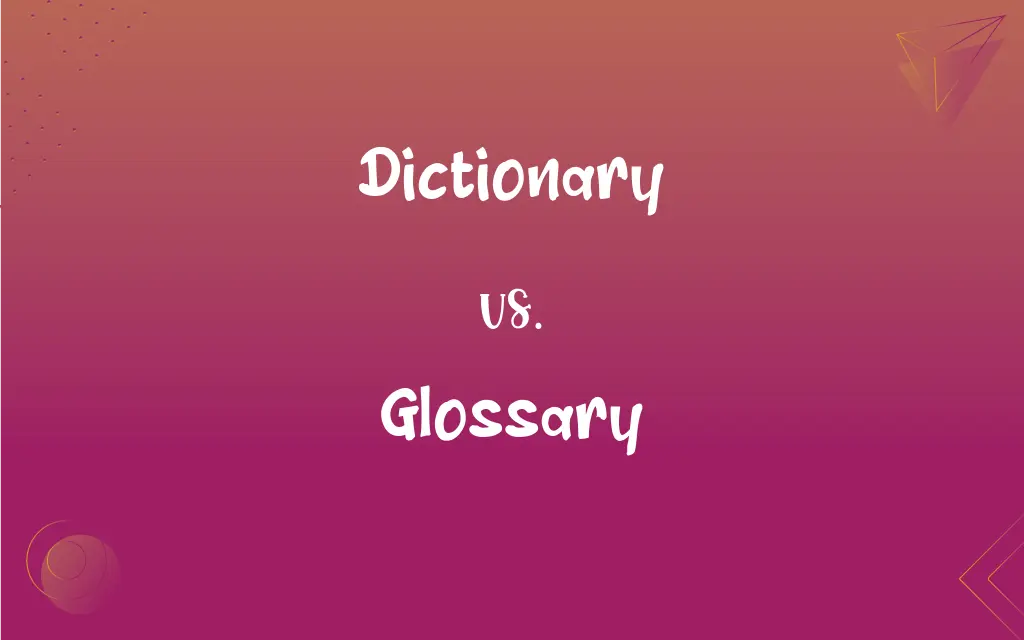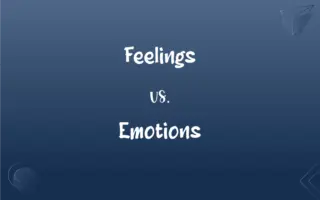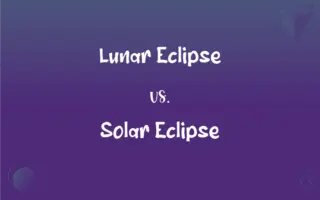Dictionary vs. Glossary: What's the Difference?
Edited by Aimie Carlson || By Harlon Moss || Published on January 17, 2024
A dictionary is a comprehensive reference of words and their meanings, whereas a glossary is a list of terms and their definitions, typically related to a specific field or text.

Key Differences
A dictionary is a collection of words in a language, presented alphabetically with definitions, pronunciations, and usage. In contrast, a glossary is a list of specialized or technical words with definitions, usually found at the end of a book or article.
Dictionaries cover a wide range of words, including general vocabulary, slang, and historical terms. Glossaries, however, focus on terms specific to a particular subject, aiding understanding within a specific context.
The purpose of a dictionary is to provide comprehensive information about the language, including word origins and synonyms. A glossary primarily aims to clarify jargon or specialized terms that may be unfamiliar to a general reader.
Dictionaries are standalone reference works, while glossaries are supplementary, accompanying a specific text or field of study to aid comprehension.
Dictionaries are often extensive, covering the entire language, whereas glossaries are concise, tailored to the needs of a specific audience or subject matter.
ADVERTISEMENT
Comparison Chart
Scope
Broad, covering general vocabulary.
Narrow, focused on terms in a specific area.
Purpose
Provide meanings, pronunciations, origins.
Clarify specialized terms in a text or field.
Usage
Standalone reference for language.
Supplement to a specific text or subject.
Content
Includes wide range of words and expressions.
Limited to relevant terms of a particular subject.
Audience
General, for anyone using the language.
Targeted, for readers of a specific text or field.
ADVERTISEMENT
Dictionary and Glossary Definitions
Dictionary
A comprehensive collection of words and their definitions.
The English dictionary includes many new words each year.
Glossary
A list of terms in a particular domain with definitions.
The technical manual included a glossary of terms.
Dictionary
A reference work on words, their pronunciation, and usage.
The dictionary also provides examples of word usage.
Glossary
A reference section in a book defining specific terms.
The glossary helped clarify several technical phrases in the article.
Dictionary
A book or electronic resource with words of a language and their meanings.
I looked up the word in the dictionary.
Glossary
An appendix in a book for understanding specialized language.
The medical book had a glossary of healthcare-related terms.
Dictionary
A source for understanding the meaning and origin of words.
She referred to the dictionary to find the etymology of the word.
Glossary
An alphabetical list of specialized terms with meanings.
The glossary at the book's end explained all the scientific terms.
Dictionary
A tool for improving vocabulary and language skills.
He used the dictionary daily to enhance his English.
Glossary
A collection of terms and their explanations, often found in academic texts.
Her thesis included a glossary of historical terms.
Dictionary
A reference work containing an alphabetical list of words, with information given for each word, usually including meaning, pronunciation, and etymology.
Glossary
A list of often difficult or specialized words with their definitions, often placed at the back of a book.
Dictionary
A reference work containing an alphabetical list of words in one language with their translations in another language.
Glossary
A list of terms in a particular domain of knowledge with their definitions.
At the back of the book you can find the glossary.
Glossary
A collection of glosses or explanations of words and passages of a work or author; a partial dictionary of a work, an author, a dialect, art, or science, explaining archaic, technical, or other uncommon words.
Glossary
An alphabetical list of technical terms in some specialized field of knowledge; usually published as an appendix to a text on that field
FAQs
What is a dictionary?
A reference book listing words and their meanings.
What is a glossary?
A list of specialized terms with definitions in a specific text.
Can a dictionary include slang?
Yes, many dictionaries include slang and colloquial expressions.
Do dictionaries include pronunciation guides?
Yes, most dictionaries provide pronunciation information.
Do dictionaries show word origins?
Yes, they often include etymologies.
Do glossaries contain historical terms?
Only if they are relevant to the subject of the text.
Do glossaries include general vocabulary?
No, they focus on specific terms related to the text.
Are dictionaries useful for learning a language?
Yes, they are essential tools for language learners.
Are glossaries found in novels?
Rarely, unless the novel includes specialized terms.
Are dictionaries only in print?
No, they are also available in digital formats.
Can glossaries be separate books?
Typically, they are part of a larger work, not standalone.
Are glossaries common in textbooks?
Yes, especially in subjects with specialized terminology.
Is a glossary always at the end of a book?
Usually, but it can also be found at the beginning or in a separate section.
Are new words added to dictionaries?
Yes, as language evolves, new words are added.
Can a glossary be found in digital documents?
Yes, especially in eBooks and online educational resources.
How often are dictionaries updated?
Regularly, to include new words and meanings.
Can a dictionary be specialized?
Yes, there are dictionaries for specific fields like law or medicine.
Do dictionaries provide synonyms?
Yes, many dictionaries include synonyms and antonyms.
Do glossaries explain terms in depth?
They provide concise definitions, not in-depth explanations.
Is a glossary necessary in every technical book?
Not necessarily, but it's common in texts with many specialized terms.
About Author
Written by
Harlon MossHarlon is a seasoned quality moderator and accomplished content writer for Difference Wiki. An alumnus of the prestigious University of California, he earned his degree in Computer Science. Leveraging his academic background, Harlon brings a meticulous and informed perspective to his work, ensuring content accuracy and excellence.
Edited by
Aimie CarlsonAimie Carlson, holding a master's degree in English literature, is a fervent English language enthusiast. She lends her writing talents to Difference Wiki, a prominent website that specializes in comparisons, offering readers insightful analyses that both captivate and inform.







































































